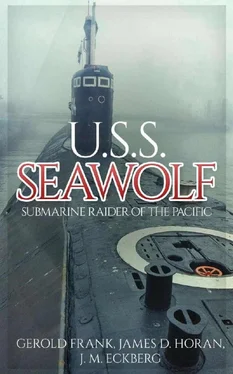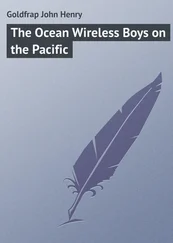I walked over the gangplank and stepped upon the dock of Corregidor.
CHAPTER III
We Take the High Command
IT WAS a perfect tropical night, with just a touch of chill in the air. The sky hung far above, strangely blue in the velvet darkness. The air seemed perfumed after the days and nights below. Off to my right was a dark blob of hilly land. That was Corregidor. Not a light shone. The shore was completely blacked out. Somewhere back there were General Douglas MacArthur and his ranking officers, mapping their defense against the Japs. The center of things had become Corregidor now: Manila was no longer in the picture. Standing there, breathing deeply, thinking about all the historic things that were being done all around me, I suddenly became conscious of a steady drone. For a moment I thought the enemy planes had come.
Then I realized that heavy trucks were plying back and forth on a sandy road which wound by the dock. A huge black shape low in the water caught my eye. I hadn’t even seen it before: it was another submarine, the Swordfish . I recognized her large periscope shear braces. On her shakedown cruise, her assembly periscopes and radio masts vibrated so badly they had to build the braces to support them.
I lit a cigarette, cupping my hands to shield the flare, and walked slowly back and forth, breathing deeply. If only there were a way for me to get word to Marjorie that I was all right!
Of course, there was a radio here on Corregidor, but it could be used for military purposes only. Personal matters, no matter how urgent, had to wait. We had no idea where the Wolf was going after Corregidor. We might be out to sea for weeks on a patrol, and never once touch a point from which we could send a message to the States. How long would Marjorie have to undergo the ordeal of uncertainty?
The Wolf ’s patrols, her comings and goings, were absolutely secret. Nothing could have been printed in the newspapers in the States, I knew. I pictured Marjorie telephoning the submarine base at New London, at Portsmouth, sending frantic wires to Washington. Months later, as a matter of fact, I learned that she did everything she could to learn about me. She told me she telephoned Washington and pleaded, “Just tell me if the Seawolf is safe. That’s all I want to know. I want to know if my husband is alive.”
They told her, “We’re sorry, Mrs. Eckberg. Frankly, we don’t even know where the Seawolf is. Things are breaking so fast I don’t think anyone but President Roosevelt or Secretary Knox could tell you where any submarine is at any given moment now. You’ll just have to wait.”
The trucks were still going by, raising a slow dust which hung in the air like fog. The Seawolf was recharging her batteries. The heavy, nauseous fumes, blue-gray in the darkness, poured out of her exhaust pipes.
Suddenly, someone hit me a terrific blow on the back. I wheeled around. A giant of a man was standing there. In the darkness I peered up into his face.
“Eck, you red-headed son-of-a-gun, how in hell are you!”
Then I recognized him. It was Bull Kiser from ’Frisco, a radioman on the Swordfish . I’d gotten drunk with him in different parts of the world more times than I could remember. He was one of the strongest men I knew. His fingers were so large that when he’d punch a typewriter key, two letters jumped up.
So there, on the wooden dock at Corregidor, we thumped each other on the back and shook hands and talked over things. The Swordfish had been doing all right, he said.
“But we can’t ever stick around to see whether they go down,” he complained.
Like the Wolf , she had been attacking Jap men-of-war, and it was unhealthy to hang around after an attack to check up.
“We had plenty of close calls,” he said.
He was not underrating the Japs, either. They were strong, they were treacherous, they weren’t anything to laugh off too quickly. But we both agreed that the fact that we’d been able to re-enter Manila Harbor would prove to the Japs that their surface blockade couldn’t keep us from coming in and going out as we liked. That would be bad medicine for those hissers to swallow.
By this time we had to get back to our boats. We shook hands. I never saw him again.
Quite a talkfest was filling the air in Kelly’s Pool Room when I climbed down. Maurice (“Red”) Jenkins, Chief Machinist’s Mate, who came from Ohio and could make dice turn somersaults, wanted to know what in the name of Mary were we going to do now. Pop Rosario, the Filipino messboy, whose wife and children were, as far as he knew, dead at the hands of the Japs, would have been happy to climb out on the dock and meet the Japs hand to hand when they finally closed in. Where were we going now? Everyone guessed and nobody knew. Why had they brought us into Corregidor again? What was our next job?
That night we heard Tokyo Rose call for the surrender of the men on Bataan. “You are encircled,” she cried. “You can give up now without dishonor.”
“_____, ________,” someone said precisely and profanely. We laughed.
At dawn the Wolf went out to sea again and submerged. Once more we heard the dull rap! rap! of Jap planes dive-bombing our shipping in Manila Harbor. We thought, “Well, hell, General MacArthur isn’t going to let them get away with that too long! He’ll get even, all right. We don’t have to worry about that.”
At dusk we surfaced and came into the same dock as before. Now we set to work in earnest. There were stores to load, and we worked without rest. Apparently we were going out that same day, and we weren’t going out on a picnic. The sun rises in that latitude about 5 a.m., and we had to work fast if we wanted to get outside the mine, field while it was still dark, and remain on the surface and still be fairly well hidden from the Japs. By midnight oil lines had been hooked up to the Wolf , and hundreds of gallons were flowing into our tanks. We worked like stevedores bringing the endless stores aboard. The highly secret and confidential papers and other invaluable data were stowed in a safe position. I helped with the fuel line, and I carried boxes aboard. I looked over my radio gear, checking and rechecking it.
About an hour before midnight, as I was working in the sound room, Gunner Bennett stuck his head in. He had four yellow rectangular cans in his hands. I thought they were candy, at first—cans of hard candy.
“You know what these are, Eck?” said Gunner. “Dynamite.” And before I was able to bounce back from that news, he said, “Here’s the dope. Plant these. If we have to, before this ship is captured or abandoned, we got to destroy all gear that might help the Nips. That includes your radio and sound gear.”
He gave me the cans, and I took them gingerly. Then he stuck his hand in his pocket and brought out four fuses, about five feet long. “These are slow-burning,” he said. “But if you have to set them”—he grinned—“it won’t matter if you get out of here fast or not. You won’t be going nowhere.”
We both laughed. I didn’t think it was a very funny joke, and neither did Gunner. I stowed the dynamite into one of the lockers in the sound room and forgot about it.
At midnight the intercom coughed and announced “Deck force on deck. Others remain below. We are pulling out in a few minutes.”
As I crossed through the control room on my way to the radio shack, I saw a man’s legs coming down the conning tower ladder.
Life on a sub is so intimate that you instantly recognize your crewmates from any angle of vision you see them, and whether they are nude or fully dressed, walking away from you or coming toward you. These legs were strangers. And whoever it was, he was wearing big brown Army regulation shoes—something none of us wore on the Wolf . Then a pair of khaki trousers; and finally the rest of the stranger. He wore a tan field jacket; he turned, and I glimpsed a staggering amount of gold braid on the visor of his cap. Then I recognized him from photographs I’d seen. It was Captain James Fife, Jr., one of the highest submarine command officers in the United States Navy. Later he became Chief of Staff, Submarines, Asiatic Fleet, and received the Distinguished Service Medal. A broad-shouldered, rugged sea veteran, he looked around, his practiced eye taking in the Seawolf’ s control room in one approving glance, nodded a courteous “good day” to me, and strode to the charts and began studying them.
Читать дальше






![Hubert Bancroft - The Native Races [of the Pacific states], Volume 5, Primitive History](/books/749157/hubert-bancroft-the-native-races-of-the-pacific-s-thumb.webp)

![Hubert Bancroft - The Native Races [of the Pacific states], Volume 1, Wild Tribes](/books/750126/hubert-bancroft-the-native-races-of-the-pacific-s-thumb.webp)



![Edward Ellis - Adrift on the Pacific - A Boys [sic] Story of the Sea and its Perils](/books/753342/edward-ellis-adrift-on-the-pacific-a-boys-sic-s-thumb.webp)